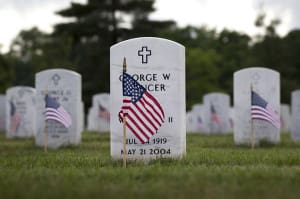 Archbishop Wilton D. Gregory was the sixth archbishop of the Archdiocese of Atlanta. During his years of service, he wrote a regular column for The Georgia Bulletin entitled, "What I have Seen and Heard".
Archbishop Wilton D. Gregory was the sixth archbishop of the Archdiocese of Atlanta. During his years of service, he wrote a regular column for The Georgia Bulletin entitled, "What I have Seen and Heard".Reflecting on the faith and sacrifices of those who are gone
By ARCHBISHOP WILTON D. GREGORY | Published November 7, 2013
The always gracious staff at Arlington Cemetery in Sandy Springs is now working with the Archdiocese of Atlanta in designing a new Catholic shrine area that will feature St. John Vianney and provide for the future interment of our clergy and laity—we are fast running out of existing plots in the original Catholic section of the cemetery. Our population growth has been extraordinary over the past few decades, and therefore we must now make provision for the future funeral needs of the much-increased number of our people.
November begins that season when as our part of the globe goes into its resting period, we annually reflect in faith on our deceased family members, relatives and friends.

Headstones are seen at Arlington National Cemetery in Virginia. CNS photo/Nancy Phelan Wiechec
Cemeteries are places of spiritual significance for all people—those who claim religious heritage and even those who profess no religious faith. These places are sacred because of the interred remains of our loved ones. They are sites for memories and faith, for gratitude and for devotion. In our contemporary world where cremation is an increasing practice even among Catholics, we need to remember that all cemeteries should be prepared to receive the remains of those who have been washed, anointed and fed by the sacramental life of the Church—our mortal remains are holy and merit a worthy and lasting place of repose regardless of their final disposition. This applies also to cremated remains.
People rightfully should be upset when the remains of a human person are disrespected or dishonored. We can all recall the public indignation when some families discovered that the remains of their loved ones were not properly interred at Arlington Cemetery—our premier place of national honor for our deceased military veterans. Arlington in Washington, D.C., is a repository for tens of thousands of military personnel and their loved ones who have served to defend and secure our nation’s freedom. People were justifiably incensed to learn that some of the bodies of our national servant heroes were not properly honored and respected. It mattered little the religious faith that a family professed, the sacredness of that place is a national legacy. We all felt that the men and women in our military deserved more respect and dignity—and they do.
However, our concern for our military personnel should go well beyond the treatment of the bodies of our deceased heroes and heroines—we must be even more concerned about the well-being of those who return to civilian life and who may have witnessed extraordinary violence and death in their service to our nation. Such experiences have often had a catastrophic impact on the lives of these men and women. Many of them are spiritually and emotionally traumatized by the events that they have endured. There are a number of organizations dedicated to providing outreach and support to returning military veterans, such as “Care for the Troops,” and some of our parishes are actively supportive of those agencies. Our people recognize the debt that we owe our veterans, and they have included these organizations in the social outreach of their parishes.
Next week, our nation will pause on Veterans Day to honor those who have served us so generously throughout our history. While cemeteries are places where we can remember our loved ones, there are moments when the heart should pause in gratitude for the contributions that people have made to our lives—personally and as a nation.
The entire month of November in the Catholic calendar is a time dedicated to remembering the faithful departed—relatives, friends, neighbors and those whose sacrifices have benefitted the people of our country.
May the souls of all the faithful departed rest in peace! Amen.